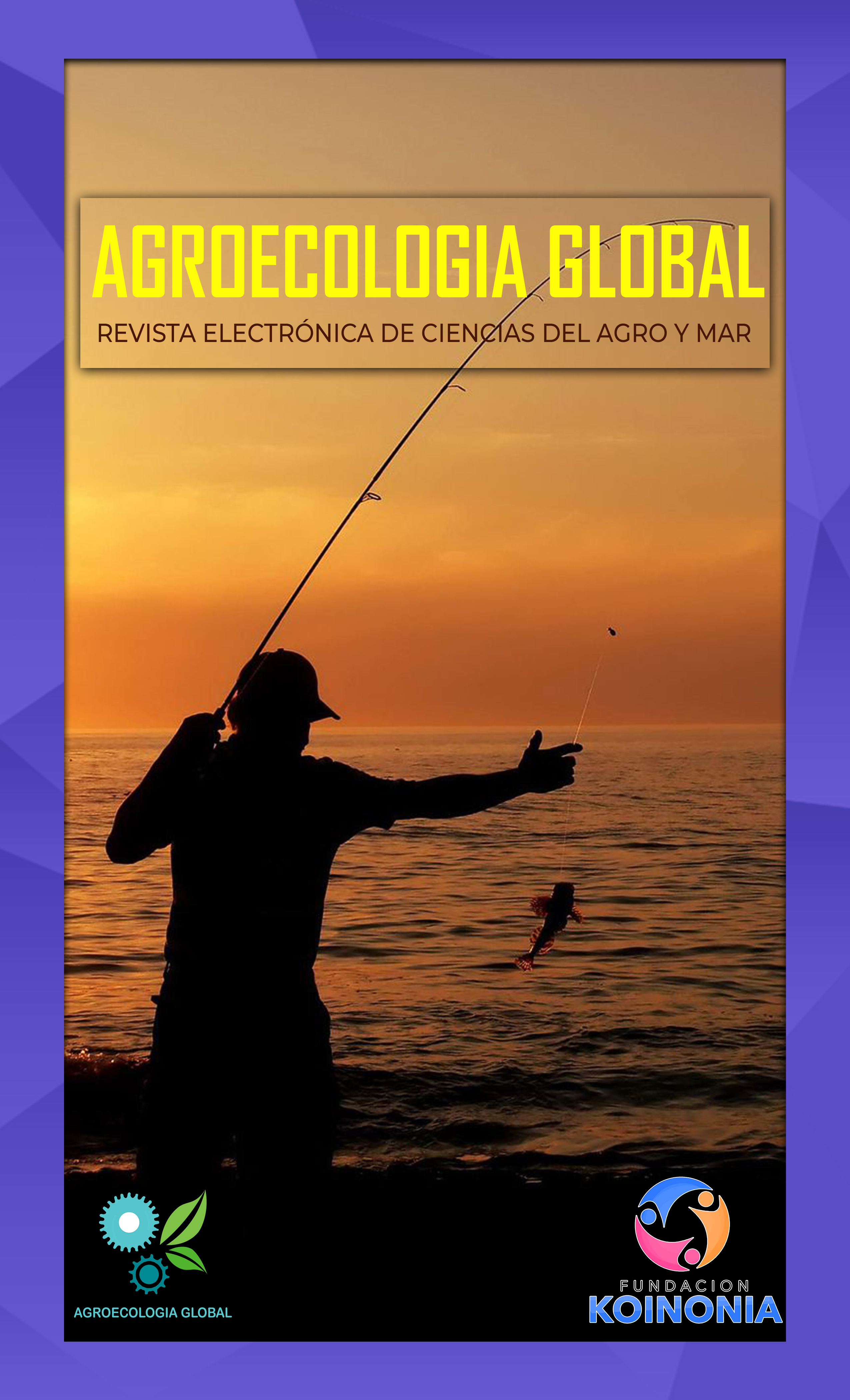Variability in the population structure of Anadara tuberculosa and Anadara similis in El Oro, Ecuador
DOI:
https://doi.org/10.35381/a.g.v7i13.4575Keywords:
Population structure, Anadara tuberculosa, Anadara similis, aquatic resources, (AGROVOC Thesaurus)Abstract
In Latin America, several initiatives regulate the exploitation of aquatic resources, especially bivalves such as Anadara tuberculosa and Anadara similis, species that inhabit the mangroves of the Ecuadorian Pacific. The objective is to analyze the temporal variability in the population structure of Anadara tuberculosa and Anadara similis in the province of El Oro from 2021 to 2023. Data collected by the Instituto Público de Investigación de Acuicultura y Pesca del Ecuador were used and statistical methods such as linear regression and the chi-square test were applied. The results showed a trend of an increase in individuals below the average catch size, especially in the summer season, and alterations in sex ratio and gonadal maturity, with implications for fisheries management. The conclusions highlight the need for adaptive management strategies and constant monitoring to ensure the sustainability of these species.
Downloads
References
Camilo, V. M. A., Souza, J. D. C., Conceição, E. J., Luz, J. R., Boehs, G., & Campiolo, S. (2018). Reproductive cycle of Mytella guyanensis (Lamarck, 1819) in a Marine Reserve (RESEX Bay of Iguape), Bahia, Brazil. Brazilian journal of biology, 78(2), 255–264. https://doi.org/10.1590/1519-6984.05716
Instituto Público de Investigación Acuícola y Pesquero [IPIAP]. (2025). Concha. Análisis mensual del recurso Concha (Anadara tuberculosa y A. similis) 2019-2025 https://institutopesca.gob.ec/concha/
Jefferson, T., Costello, M. J., Zhao, Q., & Lundquist, C. J. (2021). Conserving threatened marine species and biodiversity requires 40% ocean protection. Biological Conservation, 264, 109368. https://doi.org/10.1016/j.biocon.2021.109368
Matsuzawa, Y., Fukuda, S., Ohira, M., & De Baets, B. (2023). Modelling fish co-occurrence patterns in a small spring-fed river using a machine learning approach. Ecological Indicators, 151, 110234. https://doi.org/10.1016/j.ecolind.2023.110234
Ministerio de Producción, Comercio Exterior, Inversiones y Pesca. (2021). MPCEIP-SRP-2021-0139-A: Plan de Acción Provincial para la Conservación y Manejo del Recurso Concha Prieta El Oro-Ecuador. (Registro Oficial de Ecuador, Primer Suplemento Año II No. 490 de 8-jul-2021). https://n9.cl/w1myf
Newton, A. C., Britton, R., Davies, K., Diaz, A., Franklin, D. J., Herbert, R. J. H., Hill, R. A., Hodder, K., Jones, G., Korstjens, A. H., Lamb, A., Olley, J., Pinder, A. C., Roberts, C. G., & Stafford, R. (2021). Operationalising the concept of ecosystem collapse for conservation practice. Biological Conservation, 264, 109366. https://doi.org/10.1016/j.biocon.2021.109366
Ordinola Zapata, E. (2022). Pesquería de invertebrados marinos y de manglar, Tumbes, Perú, 2018. Inf Inst Mar Perú, 49(1), 5-32. https://n9.cl/jr2wc
Ordinola, E., Montero, P., Alemán Mejía, S. A., Robles, J., & Guevara, M. (2022). Concha negra Anadara tuberculosa (Sowerby, 1833) y concha huequera Anadara similis (C.B. Adams, 1852) en los manglares de Tumbes. Noviembre 2020. Instituto del Mar del Perú. https://n9.cl/m9hd16
Organización de las Naciones Unidas. (2015). Transformar nuestro mundo: la Agenda 2030 para el Desarrollo Sostenible. (Documento 15-16301 (S)). https://n9.cl/61b8t
Organización de las Naciones Unidas para la Alimentación y la Agricultura. (2017). Iniciativa Pesquerías Costeras: Actividades en América Latina. https://n9.cl/5cmcj
Prado Carpio, E. C., Rentería Minuche, J., Olivo Garrido, M. de L., Martínez Soto, M., & Rodríguez Monroy, C. (2022). Estrategias para fortalecer la cadena de valor de Anadara tuberculosa (concha prieta) en Ecuador: Strategies to strengthen the value chain of Anadara tuberculosa (concha prieta) in Ecuador. Cumbres, 8(2), 21-34. https://doi.org/10.48190/cumbres.v8n2a2
Rodríguez Pesantes, D., Pozo, Y., Van Den Hende, S., Pérez, M., Reyes, J., Nieto Wigby, J., & Sonnenholzner, S. (2024). Biological and economic feasibility of cultivating the mangrove cockle Anadara tuberculosa (Sowerby, 1833) in a shrimp farm reservoir with estuarine influence in Santa Elena, Ecuador. Aquaculture Reports, 36, 102111. https://doi.org/10.1016/j.aqrep.2024.102111
Sanmartin Freire, N. J., Prado-Carpio, E., Renteria-Minuche, J., & Valarezo-Macías, C. A. (2022). Evaluación del Valor de Mercado de Anadara tuberculosa (Concha Prieta) Considerando su Calidad Física. European Scientific Journal, ESJ, 8, 32. https://doi.org/10.19044/esipreprint.8.2022.p32
Secretaría del Convenio sobre la Diversidad Biológica. (2011). Plan Estratégico para la Diversidad Biológica 2011-2020 y las Metas de Aichi para la Diversidad Biológica. Naciones Unidas. https://n9.cl/w9srm
Shamily Catherine, P. C., Bijoy Nandan, S., & Regina Hershey, N. (2024). Diversity of Bivalve Mollusks, Their Ecosystem Services, and Potential Impacts of Climate Change. In S. Joseph & A. P. Pradeepkumar (Eds.), Ecosystem Services Valuation for Sustainable Development (pp. 161-184). Springer Nature Singapore. https://doi.org/10.1007/978-981-97-4688-0_7
Valle Fiallos, B. G., Montes De Oca Sánchez, J. E., & Comas Rodríguez, R. (2023). Acciones educativas sobre el valor nutritivo y beneficios del pescado y camarón en el Cantón Santo Domingo. Conrado, 19(94), 177-185. https://n9.cl/vv7jl
Vaughn, C. C., & Hoellein, T. J. (2018). Bivalve impacts in freshwater and marine ecosystems. Annual Review of Ecology, Evolution, and Systematics, 49, 183–208. https://doi.org/10.1146/annurev-ecolsys-110617-062703
Vergara Chen, C., Medina, A., Martínez, G., Quintero, M., Collado, G., & Vargas, C. A. (2024). Exploring oxygen consumption of the bivalve Anadara tuberculosa under contrasting environmental conditions. In 9th International Engineering, Sciences and Technology Conference (IESTEC) (pp. 127-129). Panamá City, Panamá. https://doi.org/10.1109/IESTEC62784.2024.10820222
Published
How to Cite
Issue
Section
License
Copyright (c) 2025 Diego Armando Rosado-Lozano

This work is licensed under a Creative Commons Attribution-NonCommercial-ShareAlike 4.0 International License.
CC BY-NC-SA : Esta licencia permite a los reutilizadores distribuir, remezclar, adaptar y construir sobre el material en cualquier medio o formato solo con fines no comerciales, y solo siempre y cuando se dé la atribución al creador. Si remezcla, adapta o construye sobre el material, debe licenciar el material modificado bajo términos idénticos.
OAI-PMH URL: https://fundacionkoinonia.com.ve/ojs/index.php/agroecologiaglobal/oai





.png)


